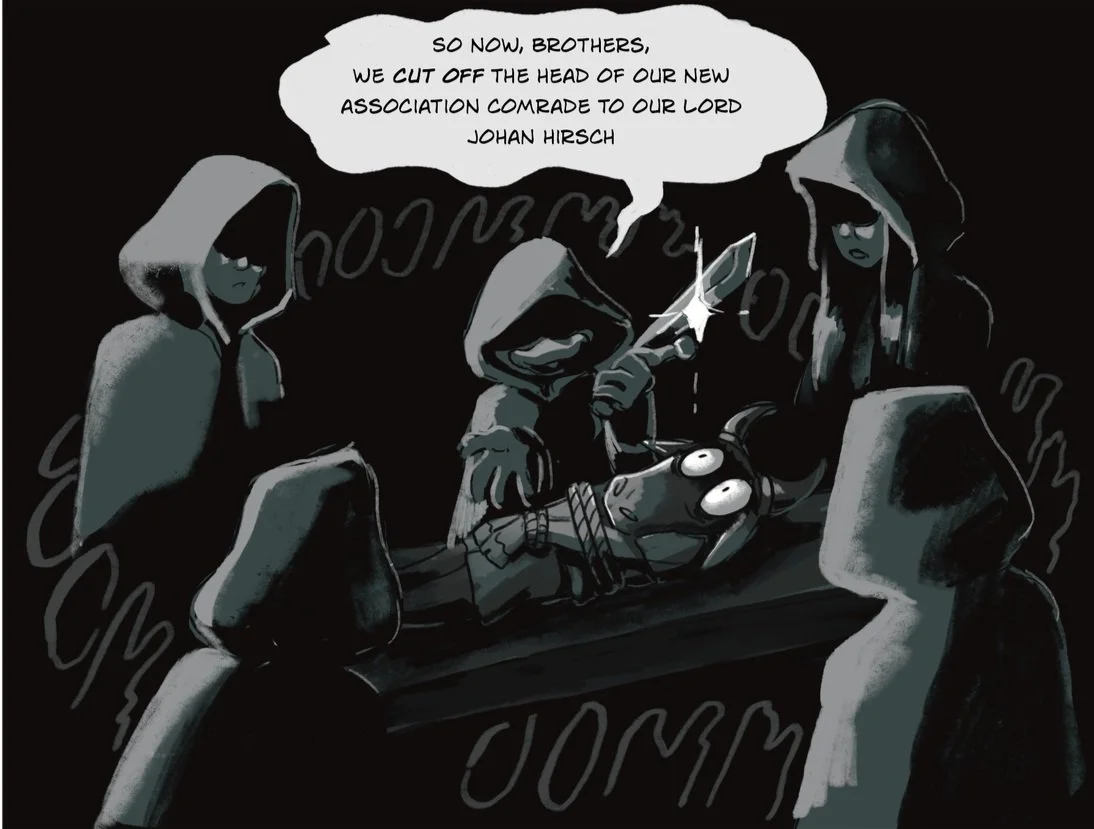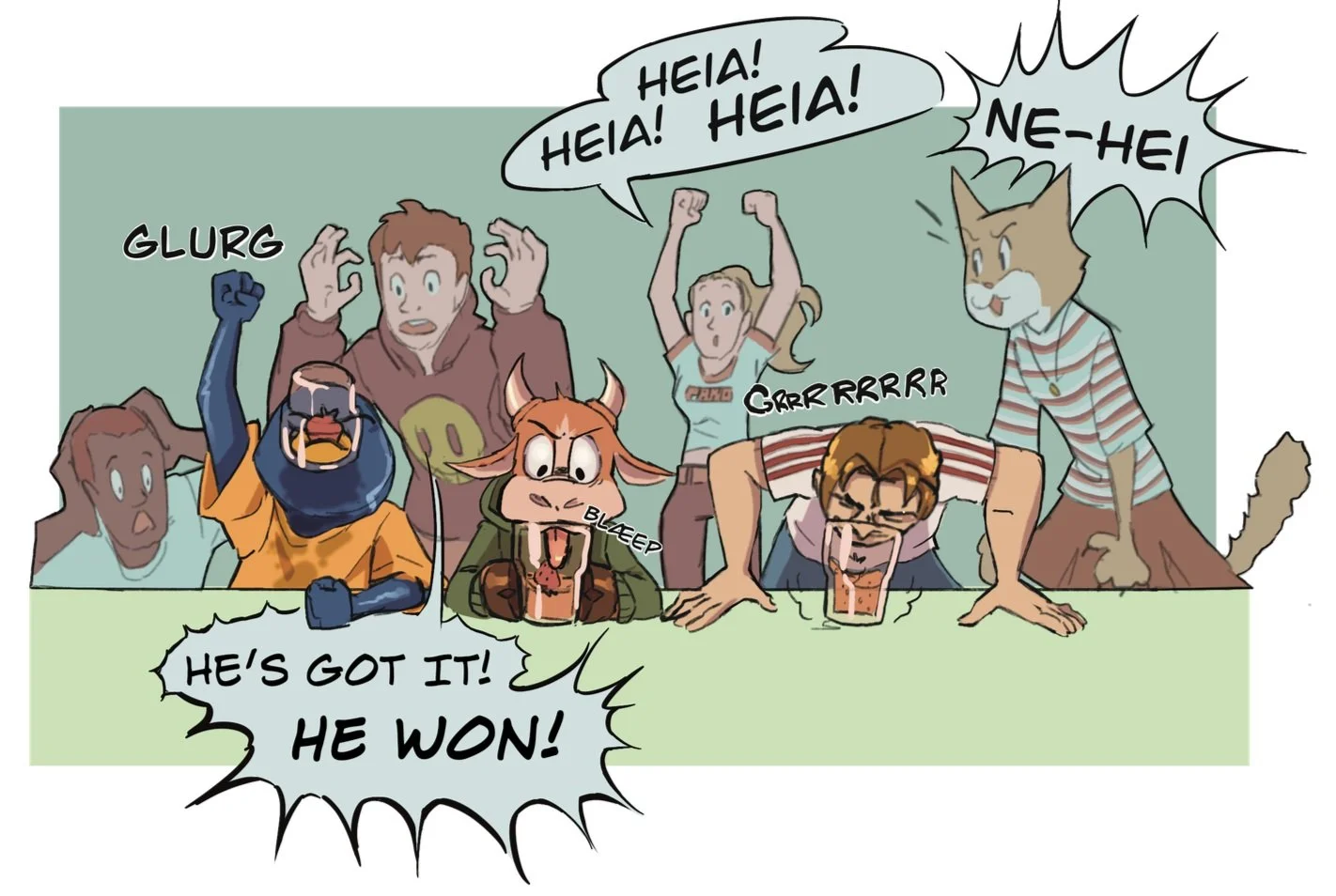The Power of a Ritual

The power of a ritual
Submitted by Benjamin Alexander Faulkner
Illustrator: Marthe Watz, Translator: Ida Haraldstad
A date with the beyond
When you think about a ritual you might think of hooded figures around an altar in a dark stone cellar. This is well within the scope of what a spiritual ritual can be. But secular rituals are among us every day. If a birthday is celebrated as a social gathering, the birthday song has to be sung. At Samfunnets general assembly the Åshymn “Jeg og’n Thorvald” (Me and Thorvald) is sung. Anything else would be preposterous. Even watching “Gullrekka” (the set Friday night line-up on NRK) on Friday evening can be some sort of ritual on a national scale, where comedians and celebrities replace the clergy. With these examples in mind, you might wonder what a ritual really entails. This is fitting, because the known and unknown rituals and customs have, until now, not gotten the attention they deserve. Ås is, in fact, overflowing with the strangest of traditions. Join us for a date with the occult ambiance that bring humanity to the edge of the beyond, e.g., Graskurs Part 2.
Hallowed atmosphere and submission
It is adorable that an academic institution like NMBU still falls victim to the temptation of a good ritual in our rational society where everything is supposed to make sense. Matriculation is a patch of spilled wine left behind from days past when the university was dead serious in what it represented. Imagine NMBU as an academic republic, with its own laws and jurisdiction, where matriculation symbolizes the students' submission to the institution – an institution where students and faculty were “priests in Minervas temple”, more or less. This was the standard for universities until 1700. Today it is no longer required for any institutions of higher education to force students into submission, but NMBU, which describes matriculation as a “mild hallowed atmosphere”, still thinks it is a little courtly. One can even give the matriculation a magical quality.
Enchanted
Our society's disenchantment is described by the sociologist Max Weber as “the iron cage of rationality”. We are pressured to give up our belief in the beyond, in what’s on the other side of our empirical reality. Some kind of explanation as to why we exist and what we are doing right now. The “enchanted” can be everything that gives us an aesthetic experience that makes one excited, admiring, or fascinated. Sometimes this happens without you even knowing why, like the woods next to Pentagon in the fall, a good Christmas concert in Ås church, the old oak out in the field, yes – even a befuddled evening in the Bodega.
"Enchantment is created and rooted in understandings and experiences of a world where there is more to life than the material, the possible, or the explainable; where the philosophies and principles of our reason or rationality cannot dream of life's totality; where the daily norms and routines of linear time and space are just a part of the story; and where the collective sum of communion and belonging, in a fleeting manner, is greater than all its individual components."
The sociologist Richard Jenkins perfectly describes the magical and spiritual that can happen, rather often, in our individual life journeys; those moments when, eerily, it feels like there is something more in the room.
Mental space
Let’s bring it back to the matriculation. This spectacle that happens on Storplenen in front of the Clock building is, as mentioned, an example of an enchanting event. Even if you don’t acknowledge the experience as something intoxicating or magical, and are much more looking forward to that evening's party, the matriculation still represents a symbolic portal into a new space in your mind. In the inner world you live in, you have now passed through a triumphal arch into a new mental space that contains the events you want to experience. That's what's magical about rituals: they are landmarks that make it easier to navigate the inner landscape of the mind. If you don't think so, at least your brain does.
Naked sprints and burnt assholes
Another element of rituals is often a feeling of powerlessness. You’re in a totally foreign situation, and you’re at the mercy of the ritual. All the funny and absolutely insane rituals that social associations engage in often entail going outside one's comfort zone. The Hannkatts asshole burning at Graskurs Part 2, Over Rævnes ultra-alcoholised entrance requirements, the Songchoir Lærkens hidden entry rituals, Unitys naked sprint and Åsblæstens ceremonious wake-up fanfare in Kringla at 05:00. Yes, even the study association Jordskifterlaget apparently have their own ritual.
Deposition
There are often different explanations between associations as to why they have to go through these rituals, and that you are at the mercy of those who know the ritual. Of course, the details of the rituals most likely have been changed with the years; maybe they’ve become more humane, but the point is the same. They’re designed to put participants on a completely new mental state – they’re “deposed” or torn down from where they were before. Participants can, from there, be placed in a new identity and group affiliation.
You and your identity
There's no doubt that student life is like being in a rowboat during a typhoon with only one oar at your disposal. We're concerned about identities because, after all, it's your perception of yourself that guides the way through your life. Your identity is your moral compass, but it's not static. If you ever find yourself in a dark stone cellar with people in dark robes, or on Storplenen during the matriculation ceremony, or singing “Jeg og’n Thorvald” in Aud.Max. – then you are truly in the Present, in a way you've never seen before; and you might discover something within yourself and others that you never knew existed.


